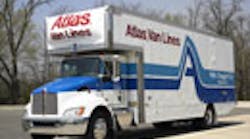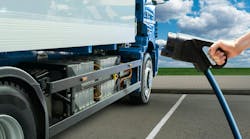The way William Duggan sees it, diesel-electric hybrid commercial trucks are good for his moving and storage business in two ways. The first is that, over time, the hybrid design will reduce diesel fuel consumption and thus save him money. By extension, though, cutting fuel use also lowers the pollution coming out of the vehicle's tail pipe; thus strengthening the appeal of his hybrid truck – and thus the attractiveness of his company to his ever-more environmentally sensitive clientele.
"The business case speaks for itself because today's client wants to do business with responsible companies," Duggan, owner and president of Wm. Duggan Co., a Walpole, MA-based Atlas Van Lines agent, told FleetOwner. "The fuel savings will pay for the cost of the hybrid … but the true return is incalculable. This technology lets us do the right thing for the environment and win new customers."
Duggan's household moving firm recently purchased a new 2010 Kenworth T370 diesel-electric hybrid straight truck from Atlas Terminal Co. and sourced from Evansville, IN, Kenworth dealer Palmer Trucks and body manufacturer Kentucky Trailer – making it the first Kenworth hybrid moving truck, according to the OEM.
The way William Duggan sees it, diesel-electric hybrid commercial trucks are good for his moving and storage business in two ways. The first is that, over time, the hybrid design will reduce diesel fuel consumption and thus save him money. By extension, though, cutting fuel use also lowers the pollution coming out of the vehicle's tail pipe; thus strengthening the appeal of his hybrid truck – and thus the attractiveness of his company to his ever-more environmentally sensitive clientele.
"The business case speaks for itself because today's client wants to do business with responsible companies," Duggan, owner and president of Wm. Duggan Co., a Walpole, MA-based Atlas Van Lines agent, told FleetOwner. "The fuel savings will pay for the cost of the hybrid … but the true return is incalculable. This technology lets us do the right thing for the environment and win new customers."
Duggan's household moving firm recently purchased a new 2010 Kenworth T370 diesel-electric hybrid straight truck from Atlas Terminal Co. and sourced from Evansville, IN, Kenworth dealer Palmer Trucks and body manufacturer Kentucky Trailer – making it the first Kenworth hybrid moving truck, according to the OEM.
"Trucks are a necessary part of our economy," Duggan added. "This technology allows us to lessen our footprint on the Earth … [but] our direct benefit is a 30% reduction in fuel consumption and a
corresponding 30% reduction in exhaust emissions."
Still, hybrid trucks are extremely expensive compared to their straight diesel counterparts – costing as much as $40,000 to $50,000 extra, noted Kevin Beaty, hybrid business unit manager for Eaton Corp. That's why it's important for fleets looking at hybrids to take advantage of any and all available incentives, Duggan told FleetOwner.
"We paid full price for our vehicle, but the Obama administration's recently created DERA [Diesel Emission Reduction Act] offers stimulus money to help offset the costs of hybrid trucks," Duggan explained. "The process requires an application for a stimulus funding grant which could pay for as much as 25% of the cost of a hybrid vehicle – as long as it replaces a diesel powered truck which is permanently disabled and taken out of service."
Duggan's Kenworth T370 Class 7 hybrid truck qualifies for IRS tax credits of up to $12,000, according to Kenworth. More information on available incentives and tax credits is available at www.epa.gov/otaq/eparecovery/index.htm and www.epa.gov/cleandiesel)
Greg Hoover, president & COO of Evansville, IN-based Atlas World Group, parent of Atlas Van Lines, pointed out that helping Atlas' network of over 500 moving and storage agents in the U.S. tap into those funds is critical to getting them to buy more hybrids.
"We work with our agents to make sure they are getting the full benefit, whether in tax credits or purchase costs," he told FleetOwner. "The bigger issue will be making them more accepted in terms of the business. Perhaps [that means more] incentives at our end; but I also think the market will drive toward this, if not our culture. Current regulations that we're seeing in various regions like Canada or California are a sign of that, as are reduced emissions for cars, etc. It's just a matter of the market following."
Hoover added that the business case will become only stronger over time. "I remember when cell phones were $1,000, and pocket calculators cost even more than that when they were introduced," he remarked. "But in both cases, people saw the value and then the cost of production came down. This is the same thing, but critical to a much more valuable commodity – our living space."
So, while he thinks there's a good business case for hybrid trucks going forward, that isn't all there is to it. "Yes, the savings might be reduced in the beginning because fuel is down and the cost of these trucks now is higher; that will adjust over time," Hoover said. "But I think there's a case to be made for doing what's right regardless of the cost. Our first obligation is to take care of our resources and planet. Hybrid trucks represent good stewardship of our resources and a commitment to being a responsible member of our communities."




